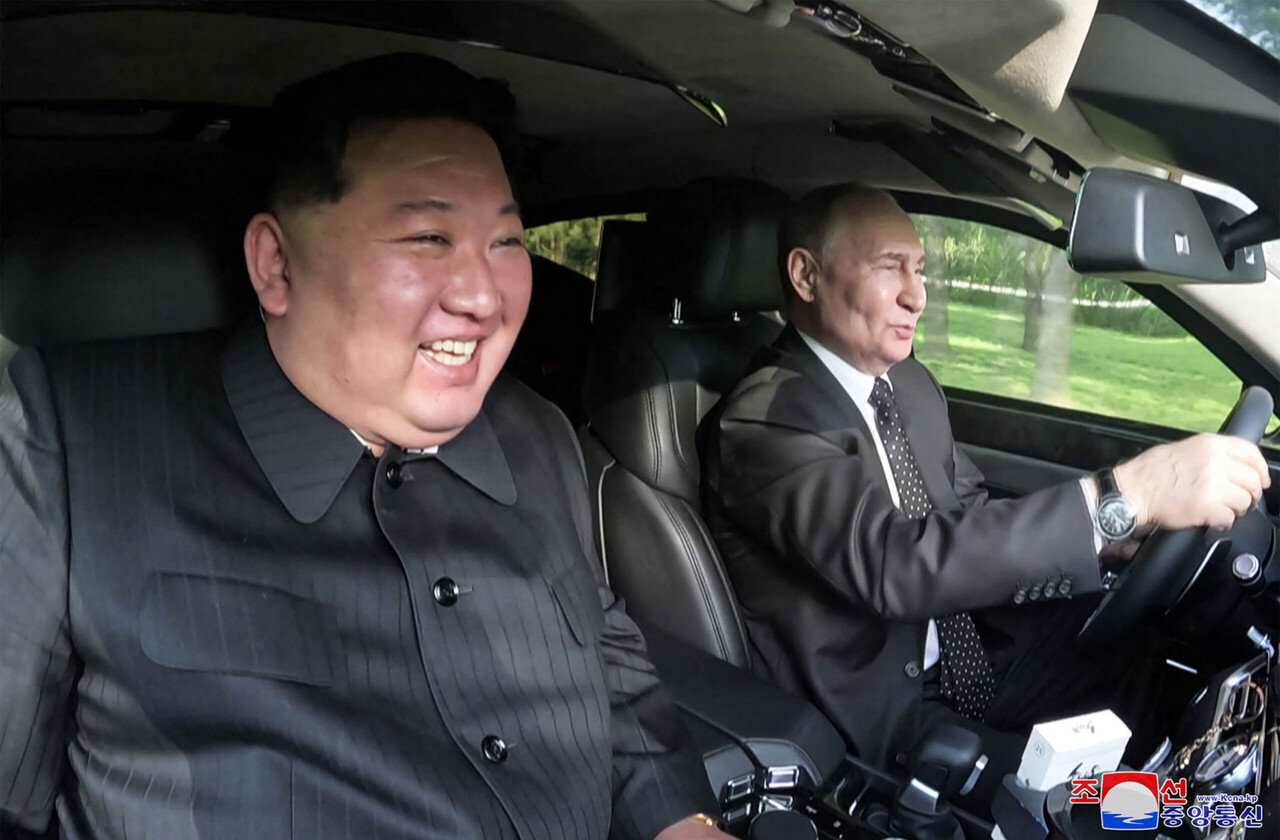China anxious about North Korea’s actions following Putin’s visit, US official says
 North Korea's leader Kim Jong Un sitting in the passenger seat of a car driven by Russia's President Vladimir Putin in Pyongyang, North Korea on June 19, 2024. (AFP Photo)
North Korea's leader Kim Jong Un sitting in the passenger seat of a car driven by Russia's President Vladimir Putin in Pyongyang, North Korea on June 19, 2024. (AFP Photo)
China, despite its close ties with Russia, is becoming increasingly uneasy about North Korea’s potential actions following President Vladimir Putin’s recent visit to Pyongyang.
This concern was highlighted by US Deputy Secretary of State Kurt Campbell, who shared insights during a discussion at the Council on Foreign Relations on Monday.
China’s anxiety stems from Putin’s latest defense agreement with North Korean leader Kim Jong Un, which promises mutual assistance in the event of an attack. This agreement has the potential to embolden North Korea, causing regional instability.
Campbell noted that China has privately conveyed its concerns to the United States, fearing that North Korea may be encouraged to take provocative steps that could escalate into a crisis in Northeast Asia.
“I think it would be fair to say that China is probably worried that North Korea will be somehow encouraged to take provocative steps that could lead to a crisis in Northeast Asia,” Campbell said.
In recent months, North Korea has increased small-scale military incidents along its border with South Korea and has adopted aggressive rhetoric, firmly resisting diplomatic engagement with the United States. This behavior, coupled with Russia’s potential support for North Korea’s nuclear ambitions, adds to the gravity of the situation.
“This is a dangerous set of developments and one that we are watching,” Campbell emphasized, pointing to the broader implications of Russia’s support for North Korea, including the possibility of collaboration on nuclear issues.
North Korea has found a steadfast ally in Russia, supplying artillery shells to Moscow amid its ongoing invasion of Ukraine. This partnership has evolved despite stringent UN sanctions on North Korea for its nuclear and missile programs.
China’s response to Putin’s visit has been notably restrained, reflecting its complex relationship with North Korea. Traditionally Pyongyang’s main ally, Beijing has recently kept Kim Jong Un at a distance. Meanwhile, the United States has accused China of indirectly supporting Russia’s military buildup through industrial exports, though not through direct arms shipments.
Campbell suggested that while China and Russia are united in their opposition to the West, their long-term interests may diverge, particularly regarding North Korea and China’s relations with former Soviet republics in Central Asia.
“I think there will likely, in the future, be a resurgence of tension between Moscow and Beijing,” Campbell said. In the short term, however, China might benefit from acquiring advanced technologies such as submarines from Russia.
Putin’s visit has also unsettled South Korea, which has maintained a cautious stance on supplying weapons to Ukraine. The recent developments might prompt Seoul to reconsider its policies in light of the strengthening Russia-North Korea alliance.
At the same time, tensions have been rising between China and the Philippines, a US treaty ally, over disputed waters. The latest clash saw a Filipino soldier injured, losing a finger.
Campbell highlighted that the United States remains committed to its defense treaty with the Philippines and is in “close consultations” regarding the recent confrontations. He declined to elaborate on specific actions that would trigger the treaty but assured that the US has taken “private steps” to manage tensions.
“The Philippines does not seek a crisis with China. They are seeking dialogue,” Campbell said, underscoring the cautious approach Manila is taking in its interactions with Beijing.
As China navigates its complex relationships with both North Korea and Russia, its actions in the region will be closely watched by global powers, especially as tensions simmer in Northeast Asia.



